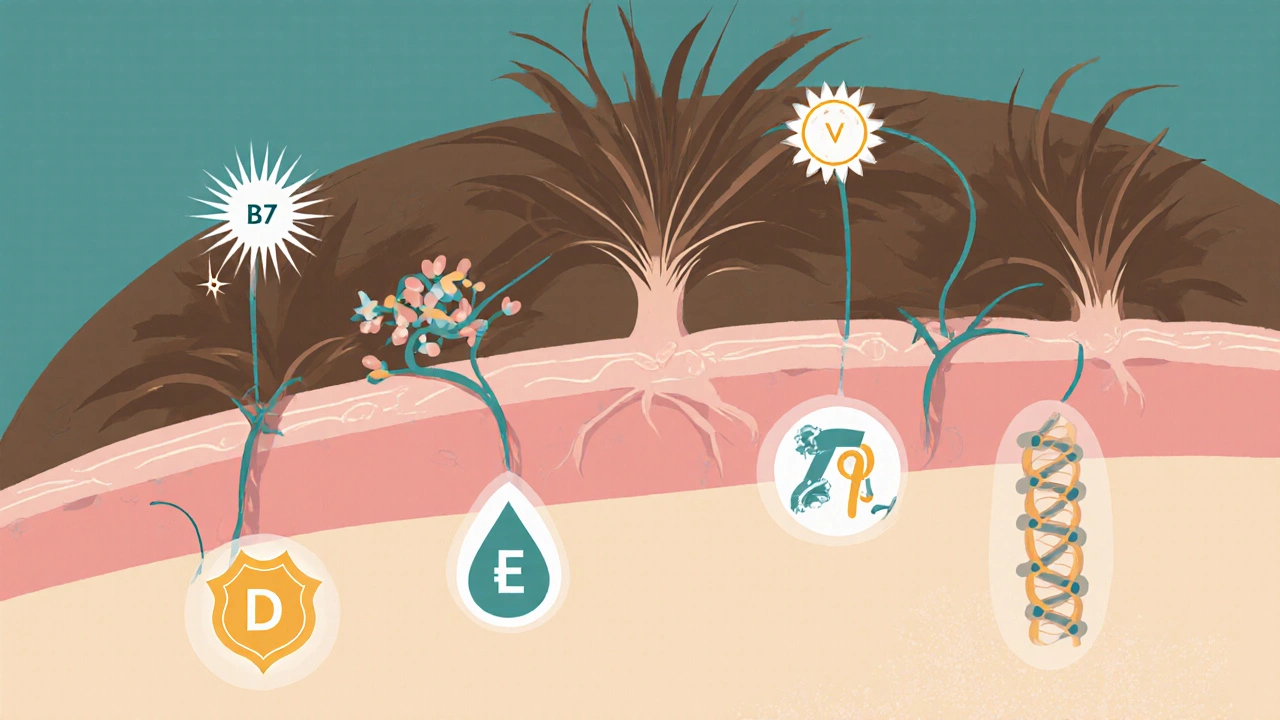Hair Vitamin Dose Calculator
Select Your Primary Hair Concern
Quick Takeaways
- Biotin (B7) is the most researched vitamin for stronger, thicker strands.
- Vitamin D, E, A and C each target a specific hair‑loss cause - from inflammation to scalp dryness.
- Whole foods beat supplements for absorption, but a well‑chosen pill can fill gaps.
- Stick to recommended doses; more isn’t always better and can cause side‑effects.
- Pair vitamins with a balanced diet, gentle hair care, and stress management for real results.
When it comes to stronger strands, Biotin is a water‑soluble B‑vitamin (B7) that supports keratin production and improves hair elasticity. But you’ve probably heard about vitamin D, vitamin E, even vitamin A being good for hair. So, which one actually works? This guide breaks down the science, doses, food sources, and practical tips so you can pick the right vitamin for hair without wasting money on hype.
Why Hair Needs More Than Just Shampoo
Hair isn’t just a decorative filament; it’s made of keratin proteins that grow from follicles fueled by blood‑borne nutrients. When your diet lacks key micronutrients, the follicle can’t produce healthy keratin, leading to breakage, thinning, or shedding. Vitamins act as co‑factors for enzymes that:
- Convert food into usable energy (B‑vitamins).
- Maintain scalp oil balance (vitamin E).
- Regulate inflammation and hormone pathways (vitamin D).
Understanding which nutrient addresses your specific hair issue makes the difference between random trial‑and‑error and targeted improvement.
How Vitamins Influence Hair Growth
Each vitamin plays a distinct biochemical role:
- Biotin (B7): activates enzymes that attach sulfur atoms to keratin, making strands stronger.
- Vitamin D: binds to receptors on dermal papilla cells, stimulating the growth phase (anagen) of the hair cycle.
- Vitamin E: protects scalp cells from oxidative damage caused by free radicals.
- Vitamin A: helps sebaceous glands produce sebum, which keeps the scalp moisturized.
- Vitamin C: aids iron absorption and collagen synthesis, both crucial for follicle structure.
When any of these processes falters, you notice slower growth or increased shedding.
Top Vitamins for Hair Health
Below are the five most studied vitamins that show a measurable impact on hair strength and density.
Biotin (Vitamin B7)
Biotin deficiency is rare, yet many with thinning hair find a noticeable boost after supplementation. The typical adult dose ranges from 30 µg (the RDA) to 5 mg for therapeutic use. Sources include egg yolks, nuts, and cauliflower. Clinical trials report a 30‑40% reduction in hair shedding after 90 days of 2.5 mg daily.
Vitamin D
Low serum 25‑hydroxy‑vitamin D correlates with alopecia areata and telogen effluvium. A daily 1,000‑2,000 IU supplement can restore normal levels in most adults. Sunlight exposure (15 minutes mid‑day) and fatty fish such as salmon are natural ways to boost D‑status.
Vitamin E
As an antioxidant, vitamin E reduces oxidative stress on scalp cells. A 200 mg (≈300 IU) dose daily improved hair growth in a 12‑week study of women with patterned hair loss. Sources: almonds, sunflower seeds, and wheat germ oil.
Vitamin A
Vitamin A is essential for sebum production; too little leads to a dry, flaky scalp, while excess can cause hair loss. The RDA is 900 µg for men and 700 µg for women. Sweet potatoes, carrots, and dark leafy greens supply the needed retinol.
Vitamin C
Beyond its antioxidant power, vitamin C enhances iron absorption-a crucial mineral for oxygen transport to hair follicles. Doses of 500 mg twice daily increase serum ferritin and have shown modest gains in hair density.

Comparison Table: Vitamins vs. Hair Benefits
| Vitamin | Primary Hair Benefit | Top Food Sources | Typical Supplemental Dose | Evidence Strength |
|---|---|---|---|---|
| Biotin (B7) | Strengthens keratin, reduces breakage | Egg yolk, almonds, cauliflower | 2.5 mg daily | Strong (multiple RCTs) |
| Vitamin D | Stimulates follicle growth phase | Sunlight, salmon, fortified milk | 1,000-2,000 IU daily | Moderate (observational & small trials) |
| Vitamin E | Protects scalp from oxidative damage | Almonds, sunflower seeds, wheat germ oil | 200 mg daily | Moderate (single RCT) |
| Vitamin A | Maintains sebum, prevents dryness | Sweet potatoes, carrots, liver | 750-900 µg daily | Weak (imbalanced data) |
| Vitamin C | Improves iron absorption, supports collagen | Citrus, bell peppers, kiwi | 500 mg twice daily | Weak‑moderate (few trials) |
Food‑First or Supplement‑First?
Most nutrients are better absorbed from whole foods because they come with cofactors that aid uptake. For example, biotin in egg yolk is bound to avidin, a protein that can actually block absorption if the egg is raw. Cooking deactivates avidin, making the biotin usable.
If your diet already includes a rainbow of fruits, vegetables, nuts, and lean proteins, you may only need a low‑dose multivitamin to cover any gaps. However, if you’re vegetarian, have a medical condition that limits absorption, or simply struggle to eat enough nutrient‑dense meals, a targeted supplement can be a smart backup.
How to Choose the Right Supplement
- Check the label for USP‑verified purity. Look for “no artificial fillers” and “third‑party tested.”
- Match the dose to your need-therapeutic doses for hair issues are higher than the basic RDA but should stay under the Upper Intake Level (UL) to avoid toxicity.
- Prefer capsules or softgels that contain the vitamin in its most bioavailable form (e.g., methyl‑cobalamin for B12, d‑alpha‑tocopherol for E).
- Read customer reviews for consistency-some brands have batch‑to‑batch variance.
- Consult a health professional if you’re pregnant, nursing, or on medication (vitamin A excess can be teratogenic, for instance).
Common Mistakes and How to Avoid Them
- Thinking more is better. Excess biotin can interfere with lab tests; too much vitamin A can cause hair loss, not growth.
- Skipping a balanced diet and relying solely on pills. Vitamins work best alongside protein, iron, and healthy fats.
- Ignoring scalp health. Even with optimal vitamins, an oily or overly dry scalp can hinder growth.
- Expecting overnight miracles. Most studies show visible improvement after 3-4 months of consistent intake.
Putting It All Together: A Sample 30‑Day Plan
- Day 1‑7: Add a daily multivitamin containing 100 µg biotin, 800 IU vitamin E, and 500 µg vitamin A.
- Day 8‑14: Introduce 1,000 IU vitamin D capsule taken with the biggest meal of the day.
- Day 15‑30: Increase biotin to 2.5 mg (if no lab test interference) and add 500 mg vitamin C split between breakfast and dinner.
- Throughout: Eat at least two servings of fatty fish, one cup of leafy greens, and a handful of nuts daily.
- Track: Note shedding, breakage, and scalp comfort weekly. Adjust doses if you notice irritation.
This routine balances food sources with supplements, respects safety limits, and gives your follicles enough time to respond.
Frequently Asked Questions
Can I take biotin if I’m on blood thinners?
Yes, biotin does not interact with anticoagulants. However, high doses can affect lab results for thyroid tests, so let your doctor know if you’re undergoing blood work.
Is vitamin D deficiency really linked to hair loss?
Research shows that low serum vitamin D levels are common in patients with alopecia areata and telogen effluvium. Restoring levels often improves the shedding phase, but it’s rarely the sole cause.
Will a high‑dose vitamin A supplement help my dry scalp?
A modest amount (around 750 µg) can support sebum production, but megadoses can actually trigger hair loss. Prefer getting A from foods like carrots rather than large pills.
How long before I see results from a hair vitamin?
Most people notice reduced shedding after 8‑12 weeks and visible growth after 4‑6 months of consistent use.
Are there any risks if I combine multiple hair vitamins?
Combining vitamins is usually safe if total intake stays below each nutrient’s Upper Intake Level. Watch out for overlapping vitamin E and A, which can add up quickly.
Next Steps
Start by checking your diet: do you regularly eat eggs, nuts, oily fish, and colorful vegetables? If not, add one or two of those foods each week. Then, if you still suspect a gap, choose a single, high‑quality supplement that targets your main concern-most people find biotin the best first step. Keep a simple journal, stick to the recommended dose, and give it at least three months before deciding if you need to adjust.
Remember, vitamins are a support system, not a magic wand. Pair them with gentle shampoo, regular trims, and stress‑relieving habits for the healthiest hair you’ve ever had.

